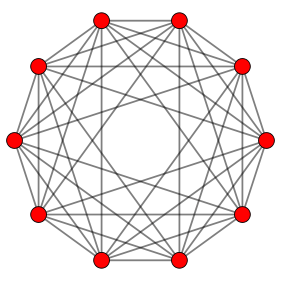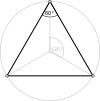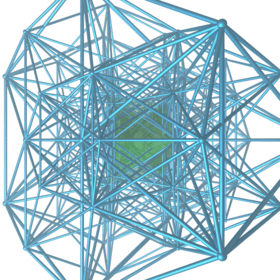5-orthoplex honeycomb
| 5-orthoplex honeycomb | |
|---|---|
| (No image) | |
| Type | Hyperbolic regular honeycomb |
| Schläfli symbol | {3,3,3,4,3} |
| Coxeter diagram | |
| 5-faces |  {3,3,3,4} {3,3,3,4} |
| 4-faces | |
| Cells |  {3,3} {3,3} |
| Faces |  {3} {3} |
| Cell figure |  {3} {3} |
| Face figure |  {4,3} {4,3} |
| Edge figure | |
| Vertex figure |  {3,3,4,3} {3,3,4,3} |
| Dual | 24-cell honeycomb honeycomb |
| Coxeter group | U5, [3,3,3,4,3] |
| Properties | Regular |
In the geometry of hyperbolic 5-space, the 5-orthoplex honeycomb is one of five paracompact regular space-filling tessellations (or honeycombs). It is called paracompact because it has infinite vertex figures, with all vertices as ideal points at infinity. With Schläfli symbol {3,3,3,4,3}, it has three 5-orthoplexes around each cell. It is dual to the 24-cell honeycomb honeycomb.
Related honeycombs
It is related to the regular Euclidean 4-space 16-cell honeycomb, {3,3,4,3}, with 16-cell (4-orthoplex) facets, and the regular 4-polytope 24-cell, {3,4,3} with octahedral (3-orthoplex) cell, and cube {4,3}, with (2-orthoplex) square faces.
See also
References
- Coxeter, Regular Polytopes, 3rd. ed., Dover Publications, 1973. ISBN 0-486-61480-8. (Tables I and II: Regular polytopes and honeycombs, pp. 294–296)
- Coxeter, The Beauty of Geometry: Twelve Essays, Dover Publications, 1999 ISBN 0-486-40919-8 (Chapter 10: Regular honeycombs in hyperbolic space, Summary tables II,III,IV,V, p212-213)
This article is issued from Wikipedia - version of the 3/18/2015. The text is available under the Creative Commons Attribution/Share Alike but additional terms may apply for the media files.